 By Ken McLeod. I've read other of his stuff - in particular, I've read Cosmonaut Keep, which is the volume one of which this is two. If you're inclined to read this stuff, start there.
By Ken McLeod. I've read other of his stuff - in particular, I've read Cosmonaut Keep, which is the volume one of which this is two. If you're inclined to read this stuff, start there.Thursday 28 December 2023
Book review: Dark Light
 By Ken McLeod. I've read other of his stuff - in particular, I've read Cosmonaut Keep, which is the volume one of which this is two. If you're inclined to read this stuff, start there.
By Ken McLeod. I've read other of his stuff - in particular, I've read Cosmonaut Keep, which is the volume one of which this is two. If you're inclined to read this stuff, start there.Wednesday 27 December 2023
Revue d'un livre: A World Out Of Time
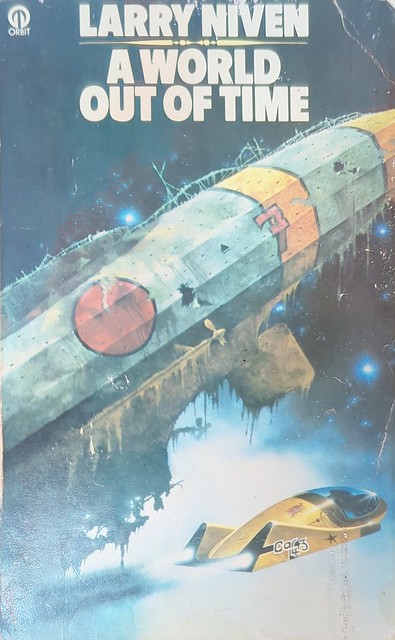 [Ce revue en Francais, pour... une epreuve.]
[Ce revue en Francais, pour... une epreuve.]Monday 18 December 2023
Chesterton / Simoco M1 over the years
 It occurs to me that we don't have a good record of club crews over the years, which is a bit of a shame. Quite who might care is another matter, of course. Anyway, this post begins to attempt a record. Note: between 2007 and 2008, Simoco was renamed Chesterton.
It occurs to me that we don't have a good record of club crews over the years, which is a bit of a shame. Quite who might care is another matter, of course. Anyway, this post begins to attempt a record. Note: between 2007 and 2008, Simoco was renamed Chesterton.2024
2023
Stroke: Shuowang He, Alistair Goodman, Conor Burgess, Adam Townson, Ralph Hancock, Harry Bulstrode , Jon Hachett, Bow: William Connolley. Cox: Will Miller. Coach: Joe Lillis. Blog post. Result: +1.
2022
Stroke: Harry Bulstrode, Jonathan Pilgrim, Steve O'Rourke, Conor Burgess, Adam Townson / Alistair Goodman, Jon Hatchett, William Connolley, Ralph Hancock. Cox: Theo von Wilmowski. Blog post. Result: -1.
2021
Stroke: Harry Bulstrode, Will Miller, Steve O'Rourke, Conor Burgess, William Connolley, Dave Richards, Ralph Hancock, Chris Wood. Cox Maddy Scragg. Blog post. Result: -2.
2020
Covid.
2019
Stroke: Tom Pryke, William Connolley, Conor Burgess, Harry Bulstrode, Dave Richards, Steve O'Rourke, Matthew Myers, Bow: Chris Wood. Cox: Manja Neumann. Coach: Charlotte Payne. Blog post. Result: row-over x4.
2018
Stroke: Tom Pryke, William Connolley, Jonathan Pilgrim, Alexander Fanourakis, Conor Burgess, Steve O'Rourke, Chris Wood, Bow: Ralph Hancock. Cox: Keith Lee. Coach: Dan McGreal. Blog post. Result: -1, +1.
2017
Stroke: Andy Southgate, Steve O'Rouke, Conor Burgess, Steven Andrews, Steve Penson, Dan McGreal, Chris Wood, William Connolley. Cox: Manja Neumann. Blog post. Result: -2.
2016
Stroke: William Connolley, Dan McGreal, Matt Woodthorpe, Conor Burgess, Simon Lloyd, Steve Penson, Brian Stevens, Keith Lee. Cox: James Tidy. Blog post. Result: +3.
2015
Stroke: Andy Southgate, Chris Wood, Mike Parrott, William Connolley, Rob Doubleday, Dan McGreal, Simon Emmings, Bow: Dave Richards. Cox: James Tidy. Blog post. Result: -2.
2014
Stroke: William Connolley, Ian Foster, Andy Southgate, Chris Wood, Ralph Hancock, Paul Holland, Dave Ifould, Bow: Dave Richards. Cox: James Tidy. Blog post (mine). Result: +1, -2.
2013
Stroke: James Howard, William Connolley, Andy Southgate, Chris Wood, Will Wykeham, Ian Foster, Ralph Hancock, Bow: Dave Richards. Cox: James Tidy. Coach: Kate Hurst. Blog post. Result: +3.
2012
Stroke: Andy Southgate, James Howard, Ollie Crabb, Will Wykeham, Chris Flowers, Steven Andrews, Paul Holland, Bow: William Connolley. Cox: James Tidy. Blog post. Result: +1, -1.
2011
Stroke: Ollie Crabb, James Howard, Tom Watt / Chris Smith, Steven Andrews, Andy Southgate, Sipper, Chris Wood, Bow: William Connolley. Cox: James Tidy. Blog post. Result: +1.
2010
Stroke: Ollie Crabb, James Howard, Tom Watt, Chris Smith, Andy Southgate, Steven Andrews, Ralph Hancock, Chris Metcalfe. Cox: James Tidy. Source: this pic. Result: -2.
2009
Stroke: Andy Southgate, Ollie Crabb, Tom Watt, Andy Hurst, Chris Wood, William Connolley, Ralph Hancock, Dave Richards / Nick Lee. Cox: James Tidy. Sources: emails, this video. Result: -3.
2008
Stroke: Andy Twigg, Tom Watt, James Howard, Chris Braithwaite, Chris Metcalfe, Ollie Crabb, John Aspden, Bow: Chris Wood. Cox: James Tidy. Source: email from JH. Result: -1.
Before 2008 we were Simoco. I joined in... 2008 perhaps? And rowed M2 that year, with Ralph as stroke. Here's a chart (from McShane) of those years.
2007
Stroke: Andy Southgate, Tom Watt, James Howard, Chris Braithwaite, Chris Smith, John Aspden, Chris Metcalfe, Chris Wood. Cox: James Tidy. Coaches: John Aspden, Rev Ian Thompson, Chris Braithwaite. Result: +3. Pic.
2006
Stroke: Andy Southgate, Jeremy Davies, Chris Braithwaite, John Aspden, Tom Watt, Chris Metcalfe, Chris Wood, Lyndon Jenkins. Cox: Lisa Edwards. Coach: John Aspden. Result: +3. Pic.
2005
Stroke: Andy Southgate, Jeremy Davies, Chris Braithwaite, Darren Payne, John Aspden, Tom Watt, Chris Wood, Alister Bailey. Cox: Emma White. Coaches: Peter Jeffrey, Paul Knights, Andy Nicol. Result: row-over x4. Pic.
2004 - 2002
Missing.
2001
Stroke: Andy Southgate, John Aspen, Andy Nicol, David Sinclair, Andy Hurst, Ralph Hancock, S. Mackrae, A. Hendrick. Cox: A. Pearce. Result: +2, -1. Pic (slightly better version, was JA's, now with KH).
2000 and before
Missing.
Sunday 10 December 2023
Book review: Involution Ocean
 By Bruce Sterling. Wiki says "The premise is influenced by Moby Dick by Herman Melville" which is right; there is a distinct tang of mad sea captain in the air, and a semi-observerish narrator, and something approaching a Whale. But none of the detail fits MD.
By Bruce Sterling. Wiki says "The premise is influenced by Moby Dick by Herman Melville" which is right; there is a distinct tang of mad sea captain in the air, and a semi-observerish narrator, and something approaching a Whale. But none of the detail fits MD.Saturday 9 December 2023
Book review: the Mystery of the Blue Train
 Another Christie. Not too bad, though (for me) rather broken up; I read it over about a month with gaps; so I was even less than usually encouraged to guess the solution. Another with "Americans" as the source of money and hence action; the Europeans are predators mostly. The driver of the story, fabulous rubies and a divorce, seems rather dull now.
Another Christie. Not too bad, though (for me) rather broken up; I read it over about a month with gaps; so I was even less than usually encouraged to guess the solution. Another with "Americans" as the source of money and hence action; the Europeans are predators mostly. The driver of the story, fabulous rubies and a divorce, seems rather dull now.Book review: the Memory of Earth
 By Orson Scott Card. Book one of a 5-book series but I doubt I go further; either I'm getting rather curmudgeonly in my old age or this book is a bit pale. Goodreads doesn't seem impressed either.
By Orson Scott Card. Book one of a 5-book series but I doubt I go further; either I'm getting rather curmudgeonly in my old age or this book is a bit pale. Goodreads doesn't seem impressed either.
Tuesday 5 December 2023
Ashmolean: Egypt
Superb stuff. I like to imagine - it would be what my novel was about, if I ever wrote one - that these beasts and gods really used to walk amongst men, and the sculpters simply drew what they saw; but over the millennia we have forgotten what once was, and assume the images are merely fabulous.
Stepping back a little to around 3300 BC, we have a colossol statue of the fertility god Min (see-also).
3300 BC is an unfathomable amount of time away. Quasi-randomly, a vulture's head.
And then, suddenly, the Greeks took a completely different turn.
Wednesday 15 November 2023
The Coton Pavillion Rebuild of 2005/6
 The Coton pavillion rebuild was a thing in... 2005/6, gosh that was a long time ago. At the time I (I think I...) started a blog about it, called https://coton-pavillion.blogspot.com/. Run by an account called "sofaman". And so it sat, for many years. I wonder if it is now owned by Ross? Google tells me it may soon be disappeared as no-use-for-ages.
The Coton pavillion rebuild was a thing in... 2005/6, gosh that was a long time ago. At the time I (I think I...) started a blog about it, called https://coton-pavillion.blogspot.com/. Run by an account called "sofaman". And so it sat, for many years. I wonder if it is now owned by Ross? Google tells me it may soon be disappeared as no-use-for-ages.So I made an archive of it, and this post to link to it. My pix on Flickr.
Refs
Monday 13 November 2023
Book review: Murder on the Orient Express
 A classic, of course. See wiki for tedious details of the plot and so on, that I won't trouble myself too much with.
A classic, of course. See wiki for tedious details of the plot and so on, that I won't trouble myself too much with.Notes
Thursday 9 November 2023
Book review: the Forever War
 A nice little blast from the old days. Goodreads likes it, as it should (my recollection is that the rest of the series is duff, though). Its kinda hardish scifi, overlaid on Vietnam-type US soldierly thinking (e.g. to improve morale, the army has mandated that the soldiers say "fuck you sir" when dismissed).
A nice little blast from the old days. Goodreads likes it, as it should (my recollection is that the rest of the series is duff, though). Its kinda hardish scifi, overlaid on Vietnam-type US soldierly thinking (e.g. to improve morale, the army has mandated that the soldiers say "fuck you sir" when dismissed).Friday 3 November 2023
C++ lambda pointers
Every now and again I get surprised by C++. TIL that if you want to write:
auto l = [] { std::cout << "I like goats\n"; };
l();
l = [] { std::cout << "I like boats\n"; };
l();
then it doesn't work: the compiler complainserror: no match for ??operator=?? (operand types are ??main()::You're trying to overwrite the lambda, and you can't. You want "l" to be a pointer. You can have this if you write?? and ??void (*)()??)
void(*l)(void) = [] { std::cout << "I like goats\n"; }; but that's tedious: you have to remember the deeply confusing C function-pointer syntax; and when you're gaily tossing off complex lambda's in the middle of code, it's worse. But it turns out that you can write auto l = +[] { std::cout << "I like goats\n"; };
and the "+" magically converts the lambda into a pointer-to. This stackoverflow post "explains" it. Fiddling around with std::function probably works too.
Thursday 2 November 2023
Book review: All the Colors of Darkness
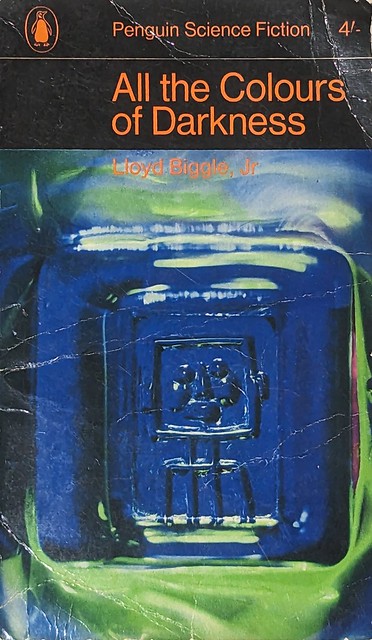 This is a nice enough Olde Tyme story, notice the four shillings price on my cover picture. By Lloyd Biggle Jr. who I know of - you remember the name - but I can't think of ay of his other stuff that I've read. Unlike With a Strange Device which is really a detective story posing as scifi this one is actually scifi, and it has a crude moral theme, of aliens-judging-Earth (see-also Conviction by Aldiss), or even fellowship-under-the-skin. Goodreads doesn't seem to have any interesting opinions.
This is a nice enough Olde Tyme story, notice the four shillings price on my cover picture. By Lloyd Biggle Jr. who I know of - you remember the name - but I can't think of ay of his other stuff that I've read. Unlike With a Strange Device which is really a detective story posing as scifi this one is actually scifi, and it has a crude moral theme, of aliens-judging-Earth (see-also Conviction by Aldiss), or even fellowship-under-the-skin. Goodreads doesn't seem to have any interesting opinions.Friday 27 October 2023
Book review: With a Strange Device
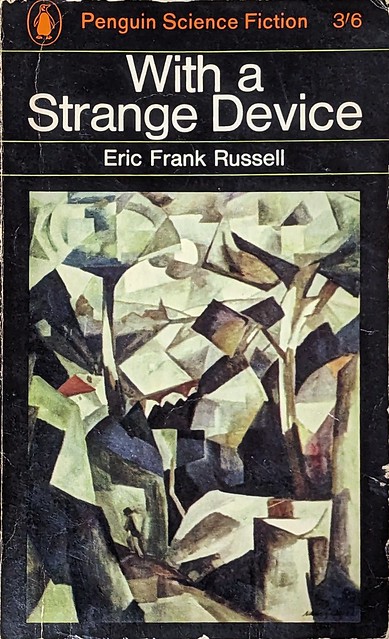 Eric Frank Russell, who I've very vaguely heard of (aah: Wasp). The story starts in a top-secret govt research lab, with a loving description of its many levels of security, and then a fade-out to "but there was a flaw...". Switch to: someone resigning, unexpectedly. Our Hero, discussing this and others who have left recently. And then... Our Hero overhears two worker-types talking, and his repressed memories of killing Arline twenty years ago are triggered. Oh noes, he must run! But he doesn't, quite. In the end (skipping over some tolerably but not very interestingly described detective-y stuff) it turns out that evil Foreigners have devised a machine able to imprint memories, and they have been doing this to knock out govt scientists, thereby crippling the national effort.
Eric Frank Russell, who I've very vaguely heard of (aah: Wasp). The story starts in a top-secret govt research lab, with a loving description of its many levels of security, and then a fade-out to "but there was a flaw...". Switch to: someone resigning, unexpectedly. Our Hero, discussing this and others who have left recently. And then... Our Hero overhears two worker-types talking, and his repressed memories of killing Arline twenty years ago are triggered. Oh noes, he must run! But he doesn't, quite. In the end (skipping over some tolerably but not very interestingly described detective-y stuff) it turns out that evil Foreigners have devised a machine able to imprint memories, and they have been doing this to knock out govt scientists, thereby crippling the national effort.Remind you of anything? Yes: The IPCRESS file. Which is 1962. This one is 1964. TIF is also far better written and in all respects superior.
Minor: for most of the book the country it is set in (UK or US) is unclear. Gradually it becomes the US. But it would have been nice and a nod to IPCRESS's unnamed protagonist for it to have remained unclear.
Sunday 22 October 2023
Book review: Mickey 7
 This is OK; indeed, better than the modern average. Reasonably well written, decent starting idea and plot, but a bit pedestrian. This review says some other things, some of which I agree with.
This is OK; indeed, better than the modern average. Reasonably well written, decent starting idea and plot, but a bit pedestrian. This review says some other things, some of which I agree with.Monday 16 October 2023
Book review: The Forge of God
 Greg Bear again. Against my better judgement I bought this from Oxfam on Saturday, and read it quite quickly, but with the expected mounting frustration.
Greg Bear again. Against my better judgement I bought this from Oxfam on Saturday, and read it quite quickly, but with the expected mounting frustration.Friday 13 October 2023
Book review: the Incandescent Ones
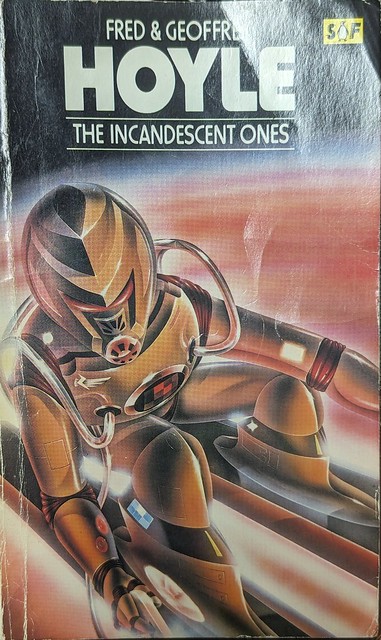 By Fred and Geoffrey Hoyle. Who have form; I liked Fifth Planet, though you may struggle to deduce that from my review. And I fondly recall The Black Cloud from my childhood.
By Fred and Geoffrey Hoyle. Who have form; I liked Fifth Planet, though you may struggle to deduce that from my review. And I fondly recall The Black Cloud from my childhood. Tuesday 3 October 2023
Book Review: Revolt in 2100
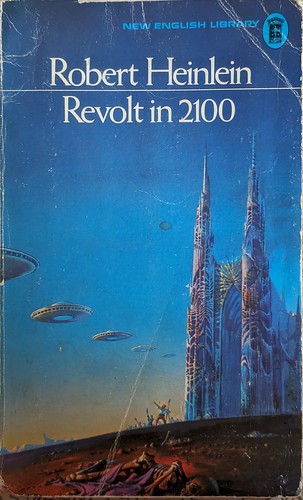 Revolt in 2100 is a charmingly jejune work, at least stylistically, I can't be bothered to check if it is so chronologically. Wiki has an article.
Revolt in 2100 is a charmingly jejune work, at least stylistically, I can't be bothered to check if it is so chronologically. Wiki has an article.Refs
Bad beekeeping, autumn 2023
 A little late, but I've been away, I decide to go and wish the girls a happy over-winter.
A little late, but I've been away, I decide to go and wish the girls a happy over-winter.
Refs
Monday 2 October 2023
Book review: Pride and Prejudice; Sense and Sensibility; Mansfield Park
 By Jane Austen. Classics, as you're doubtless aware. In the unlikely event of your being unfamiliar with the Austen oeuvre, see Wiki for P+P; S+S; MP. I enjoyed reading them, which is why I read all three2. They are well written, athough in inevitably somewhat dated form, but occasionally charmingly so in the spelling: people for example do not choose, they chuse.
By Jane Austen. Classics, as you're doubtless aware. In the unlikely event of your being unfamiliar with the Austen oeuvre, see Wiki for P+P; S+S; MP. I enjoyed reading them, which is why I read all three2. They are well written, athough in inevitably somewhat dated form, but occasionally charmingly so in the spelling: people for example do not choose, they chuse.To an extent the books blur together in my mind: young ladies - genteel young ladies, of course - floating in society with thoughts of matrimony to suitable - and of course suitably moneyed - men are the subject of all of them.
Wiki calls P+P a novel of manners and this seems fair of all; whilst one can still see that many of the judgements would still be valid today, for example of Mr Crawford's character in MP, nonetheless the suffusion of bowing to social convention is far stronger that could be entertained now.
In all the books a central driving force is money, or estate, in the sense of marrying for it, this being the only way that a poor but genteel person could hope to become rich or even well off. There is a delightful fragment in one of PoB's where Mrs Williams worship of fortune is excused, on the grounds that neither she nor any of her friends would be able to earn even pin-money from their own talents. And one feels that none of the central characters in Austen ever display much in the way of skills that could ever earn them anything1. Perhaps even in this theme there is a lot of excuse: her real theme is people's emotions and characters and development under stress; impending marriage is her chosen stress; and estate merely drives the plot conveniently. What stratum of society are these people? I find it hard to know. By their houses ye shall know them? In which case they are near the top, in that they occupy the largest of houses, at least in their neighbourhoods. And so I think I do not know any people like them today, and so perhaps I don't know whether marriage-for-money still applies, in today's analogues.
As well as stories the books are intended to be, and are, instrunctional, moral. We learn what behaviour will lead to ultimate rather than short term happiness. We see flashy fashionable characters reproved by steady and more sensible ones; even excessive sensibility is criticised. Good sense, sound judgement, quiet reflection, continence in speech are all praised.
On the relativity of morality
A question that could be asked is, "how much is Austen arguing for morality, in the sense of person's being guided by the one known to a given society, as against arguing for one particular morality - the one she herself knew?" Phrased like that the question doesn't really work because I doubt she ever considered it, being so sure that the one she knew was the only possible one; but phrased as "as illuminated by the stories she tells" it would make sense.
I think I could make a case for her being in favour of the former. Her principle desire seems to be family and sociable stability, and reputation, and decourous and honourable behaviour, all of which are satisfied by obedience to whatever code of morality is currently present.
Obviously, the plot devices would have to be different: our own code can hardly conceive that putting on a play might be immoral.
Refs
* Book review: Ancillary Sword.
Notes
1. To be fair, the lawyer in S+S is sympathetically described; Austen herself feels no need to look down upon him.
2. As well as them being available on Gutneberg for free for Kindle, of course.
Sunday 1 October 2023
Book review: The Moon is a Harsh Mistress
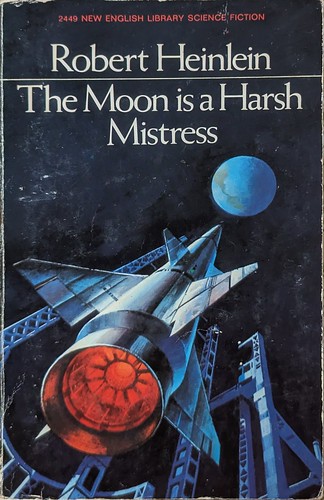 Read Wiki or Goodreads if you will; you'll get what you expect, I expect.
Read Wiki or Goodreads if you will; you'll get what you expect, I expect.As a space-opera type story its good: poor oppressed ex-convicts revolt against evil bureaucratic oppressors to form the Frre State of Luna, with the aid of a sentient computer. And as usual for RAH, there's the political philosophy: in this case, anarcho-capitalism (not Libertarianism, I think). He doesn't make any attempt to indicate why A-C is a good idea here, whereas limited-franchise democracy was a good idea in Starship Troopers. And by the end of the story we have a Congress elected by univeral suffrage with law making power, so I'm not really sure there's a lot of consistency in his thoughts.
The expounding-of-ideas is too irritatingly didactic, more Glory Road than ST. The vision of "law" that he presents us with, as being of the choose-your-own-judge sort, doesn't seem entirely plausible; and the narrator's insistence that there are no laws, just customs, is dishonest. We're presented with one example of law in action, where the right answer is achieved, but that does not convince.
I'm not sure why he felt the need to kill off the computer in the end; perhaps because it would have been left all to obviously in charge otherwise?
Thursday 28 September 2023
Book review: the Moat Around Murcheson's Eye
 Bought from the Abbey Bookshop in Paris, as something to read while waiting for the 23:45 bus from Bercy-Seine to London. As such, it was adequate.
Bought from the Abbey Bookshop in Paris, as something to read while waiting for the 23:45 bus from Bercy-Seine to London. As such, it was adequate.Monday 28 August 2023
France part five: Belledonne
After B d' O to V; around V; Ailefroide to Les Deux Alpes; and back to B d'O I start off in the Oberland. We're now in the seriously unplanned section of the trip; I need to get to Arles by the weekend, but otherwise have some time free, and the Belledonne seems like a good choice.
Mon 28th: [GPS, pix]: wake in night and open window to let in the sound of rain. Wake 7: yup, cloud and not-heavy rain. Duolingo in comfort of bed. B'fast 8 is good, looking out at the cloudy hills. Talk with Dutch cyclist and Oz walker, the latter about to start the GR54, probably from la Grave skipping the "relatively boring" Huez / Emparis stage. I'm probably going to do Huez and see how it goes. There's snow at 2200 m! I'm starting to worry about my shoes a bit, they're getting frayed.
11: I've managed to leave (b'fast was elongated) and ask in the best sports shop for a solar powered battery charger but failed (not that it would be any use today…). So now in cafe des Negotiants which is the most Fr cafe I've been in all hols: crappy Fr daytime TV, old blokes mumbling, a walker waiting out the rain (not me: its going to rain all day: I'm just doing my duty), little old ladies, football club scarves over the bar and so on.
Oberland is an old place; here it is when the gare was a gare, not a gare routiere.
I've realised the obvious: BdO is more of a cycling town. 11:20: off. Sign: Lautaret open, Galiber ferme. The 21 lacets are famous; we count them down; even I have heard of Fausto Coppi. And views down to Bourg on a grey day. Don't forget G or Tom.
Top: 2:30. Just under 3h. Interesting to walk up, and perhaps more pleasant than the path would be on a wet day. There are signs every km and every turn and graffiti on the road though less than I expected. There's also no pavement but not too much traffic. Its a fairly constant ~10% gradient and I'm going well so the 3h passes happily. For lulz, I enter my ascent as a "ride" in Strava, and discover that I'm 150,008th.

Alpe d'Huez is really bleak and empty, either in summer or just today. Which is tbh a poor day: 100% cloud, rain, somewhat windy, and cold: 6 oC says meteo. Currently in the Blueberry cafe which looked half shut but is open and warm. Just as I was thinking it was only decent to leave, as the only customer, several others come in. So I'll lurk a bit more. Vacillating: to push on, or wimp out and get a hotel? My contortions over whether to spend E95 amuse and frustrate even me. Also the meteo has worsened to 4 mm ppn in the next hour. Booked.
And so to the happily nearby Odalys AppartHotel. Which, appart from being a monstrosity, is really very nice. In terms of decor and cleanness, almost madly so. Of course it is really for the skiers. Very few hotels are open now; I wonder if they arrange amongst themselves? Go for swim mostly because I can. Watch a Falcon 9 launch. View out of window.
Tues 29th: [GPS, pix]: leave s'market 9:15 having malingered in nice Appt for a while. Also, its cold and will get warmer. Cloudy, but with breaks. Faint rainbow. Looking back to AdH:
Path is slowly up along road. Giant digger convoi exceptionel comes the other way through cloud, summer is the time for works. AdH feels bleaker, bigger, less human than L2A and while some of that is wx not all is. Oh, and most of it was shut whereas most of L2A was open.
On, and the feeling is Lakes. Navigation would be tricky if not for GPS. 10:30: chalet du lac Besson for a cafe. I am the only customer. Il y a un chat.
12:10: past the lakes, and largely past the ski crap, descend a bit towards Enversin d'Oz and stop for lunch. Fine views over to the Belledonne but not the summits. Snow above me, say at 2200 m. Sun is shining! Convert from cold gear to normal: rm down, coat, and tracksters. I've realised I'm not set up for cold wet walking: would need w'proof trous. Anyway day, whilst cloudy, is better than f'cast.
Here I'm about to drop off the L2A plateau down towards l'Enversin d'Oz; we're looking WNW; lac du Verney peeps shyly.
We're on the circuit des sangliers. 1:20: might be turning to light rain but I've just got to the resto un l'Enversin and will start with a cafe.
3: stop for some bread+cheese. Finish the last of the la Berade bread. It didn't rain. Walk up the valley nearly on traverse through lovely woods often beech a la Ashridge.
Towards the end (and its about 2:30 going through, so it does start to feel a bit endless woods most beautiful), lose my way a bit and follow logging road not track but this turns out to be fortunate as it is easier and ends in a better place. 5:30: to start of track up to Sept Laux. 2h to first lac says the sign lets hope for less. Have more b+c and some dates which are getting quite squishy.
Looking up, after a bit. Half way up: unimpressed bouquetin. 7:30: to first little (nameless) lake. Just before I get over that hump there are views back down into the valley and (probably) the village of Le Rivier D'Allemont.
Then up a bit and around lac de la Sagne because the bank provides some shelter from the wind. There's some lying snow yum. A couple of other groups tenting. There's some kind of conrete wall (hydroelectric stuff) which I consider briefly, but reject. 8:10 tarp up and me in bag. Hopefully I'll warm up a bit. Wx: in cloud. Due to slope I'm forced to be slightly head down so put boots under head. Sleepy so don't read.
Wed 30th: [GPS, pix]: well I survived and quite well. Toes a bit cold and s'bag got a bit wet that end since touches tarp. I thought of putting bin liner over and should have but was too tired to bother. In night sky clears bright moon; up for wee; pix of moonlit lac.
Lie in till 8:30 hoping for sun but no so up. There's ice on my tarp! So I know I'm good down to 0 oC and medium wind. Was in thermal leggings, tracksters, one pair socks, yellow top, down, and raincoat the latter because I forgot to take it off. Vue interieur.
Off 8:50 ref 10:30. As I go up ground gets to cts snow, quite hard frozen. I'm feeling slow perhaps lack of b'fast perhaps I worked harder y'day eve than I realised. Looking to Lac Jeplan:
Get a cafe though formally she is ferme pour menage. Sit out: wx is now clear, but haze. Spread out tarp and s'bag and socks to dry. View across lake to snowy mtns.
Q: what next? Plan was col de la Vache 2556 and the ref was but a diversion to see it and to let the sun come out. But its 3km back to the start of the col part and perhaps more importantly I'm a bit doubtful I'll get over sans crampons / axe (pic: at lac du Cos, looking up towards the col path). The alternative is a long but hopefully pleasant diversion on the "balcon des sept laux". Thought: that means that quite a lot of what I've done this month is currently out of reach.
12:10: off down. Back in trainers: wore boots this morning for the first time in ages. A little down: an old concrete hut that's used as a rather grimy bivvi.
Pass through PraPoutel, a little skiing place, and stop for a coffee. I guess I could have stopped here, but I'm still trying to reconnect to the "high" path that I wimped out of. Paths are sometimes grassy roads.
8:10: stop and bivvy. I'm kinda in the middle of nowhere… on a traverse / balcon path. Roughly here. When I decided not to col des Vaches this morning I didn't realise quite how far round it would be. Nonetheless its ok. Not as interesting as y'day's traverse, too many ski roads. But good views across to limestone cliffs of Chartreuse. Wx: still, sky clearing, won't bother with tarp to start with.
Thurs 31st: [GPS, pix]: a still dewy night with thin overcast and bright moon. Stopping in the middle of nowhere distinguished by nothing, just because I'm out of light and legs, is odd and feels wrong.
A car comes past at 7:10 - which is a surprise, this is a small track - so up and off, 7:30. Along, up through trees, then out with views of Chartreuse, and then up. After a while, views of the Ref in the sun on its out-thrust, with snowy hills behind.
Grenoble is down in the far valley. To Ref Jean Collet at 9:30, 1941 m.
Slight ache in R side back so will aim for easy day. Sun. Still. Ref appears empty so no cafe for me but! G'ienne arrives 10, warns of heli, and there will be cafe eventually. There is. 11:15: heli. Impressive flying in that there's only about 10 feet from blade tip to hut. Also top tip: the backwash is much bigger when it takes off again. Apart from a few packages it seemed to mostly deliver a couple of young children. Now I can put my s'bag out to dry again.
Cloud fills the cirque to our height. And goes again. Mme reckons snow now to 2300 and melting a little. Its quiet up here. A few people come, perhaps have a coffee, and go. By 12, more people for lunch. Mme feeds her infants indoors so sadly no pic but: small place, wood and tin, 33 places. Traditional loo. Despite the sun it isn't warm: my hands get cold, I've still got the down on. And the snow above isn't melting. Plat salé: omlette and cold rice salad. I may be hungrier than I realised.
Impressive views from ref: its on a point so view down and across; and behind cirque up to scarp with waterfalls hiding lac Blanc. Which if I keep to my "easy day" I won't see. Meantime at home M has had to book a car to Londres due to train strikes. Hopefully it will work out.
Off 12:20 as cloud fills again and a small troupeau with clean black faces misbehaves. Looking back. Pic: hut is in cen ter; path I took traverses around spur then descends into the stony river valley to R, which would lead up to lac Blanc.
Oops! went past turning and towards lac. Realise (and that I've not turned gps on) and come back, take path down too early but meh (actually, don't do that if you have the choice; it was hard work over scree). Passarelle du Mousset, 1:20, so I only lost 20 mins. And they weren't entirely wasted. Habert du Mousset: looks to be a (state sponsored) little shepherd's hut and mini refuge, with roof space for a few to sleep. A little further on, plaque to Mr Eugene Lombard, Cure Archipretre de Goncelin.
2:25: col du Sifre 2150. Leave pac, climb knoll, wonderful views: ahead to path gently slanting up into snow (err…), back across to ref, and towards bowl of lac Blanc though lac itself is hiding. Even wider pano. 2:50: off. 3:35: col 2350. It was ok.
Snow quite deep (someone said 40 cm) but there was a well trodden path. Nice to be back on snow! Listening to small stones / ice falling off cliffs. 4: little lac du Loup. Chamois.
Eat last of dates. And of the Abondance. The once mighty foodbag now contains but a trace of bread. Off: 4:20. Lac du Crozet 4:50. Sign: ref 55 min. Wash feet and paddle but cold. Off 5. From above, the still blue lake looks contiguous with the sky and the hazy blue background; lovely.
Ref de la Pra 5:40. Two buildings one old which is the dortoirs, new with cuisine / salle.
Big terrasse. View over plain with meandering stream. Go in. Power! Plug in I'm rather low. Order "petit planche" and biere. Quiet inside but then again it is lovely out: some children playing in the stream. Pano: the valley onwards.
For dinner a planche (cheese+saucisson). Save a bit of dry bread and nice cheese for b'fast. Have a biere, then a second with citron tarte. Talk to two Germans. Off 7: once again a lone figure walking out on a darkling plain. It is quite cold once the sun has gone. Because of the mtns it is setting behind, it goes and comes again. Pra was a good refuge; would come again. As I'm walking out the shepherdess is rounding up her sheep with two dogs. View back to ref; and back over lac Claret:
Stop 7:35 at the end of lac Longet with view further on (looking back). Lovely. All is calm and still the lakes mirrors. Bivvi.
Fri 1st Sept: [GPS, pix]: up 7:20 buzzed by hoverfly. Overnight: scratch off tick inside right knee. Wx good, didn't bother with tarp. Off 7:40 after scrap of b'fast saved from yesterday's planche. O'night fine v thin o'cast another bright moon. Ground is limestone, Chinese-looking, up and down.
9:15: Ref des lacs Robert. Non-guarde 4 places. Outside view.
Looking back to the lacs Robert. The tiny Ref is just visible at the far R edge in the shadow (a little above, now I look, the shadow of a bit of ski-lift).
9:45: "top" of the ski-junk area. And so we come nearly to the end of the mountains. One last distant view back to the Ecrins through the pass.
Down we go. Lots of lakes; here's a small nameless lake above lac Achard, which was goaty. And... just pause a moment and look at it: the whole scene is gorgeous.
2: whew. To Uriage les Bains. And a lot of descending that was. Quite a lot of it was pleasant through trees on paths; some on roads; but there was just lots of descent.
And my dream of walking into G is abandoned: it might be possible but its a looong way. Cafe here (finally! So many little villages no cafe) now in bus stop awaiting bus. I considered Uber, but was dubious of it in France, and also I'm cheap. Cats hug the shade.
2:38: off on bus (thnx Google). A/C! And €2 to St M d'Heres. Note: buses are much less frequent during vacances scholaires. Uni, 3; walk through uni to river to G, 3:50 cafe. Look up hotel / travel as well as I can with junk internet and… hmm, why not go to Valence?
And so to station, €20 (I was expecting less?), cafe and p-au-c in cafe, and 5:15: we're off. Crowded. Power: down to 23% phone and 11% battery. In mtns, spent some time optimising this. So would be v good to have other options.
Valence 18:30. End up in hotel de Lyon (les Negotiants was full) cheap but ok. No a/c but the noise of someone else's). Shower. Whew: several days grease comes off, much better. Realise supermarket shuts soon so rush out, get juice, yog, cheese and peaches but no bread. Ah well. Go down to river through park as recce for tomorrow then try and fail to find cafe / resto I like… I may be in wrong district. Valence fails to impress; never mind it was an experiment based on name. Retire and eat and catch-up.










































